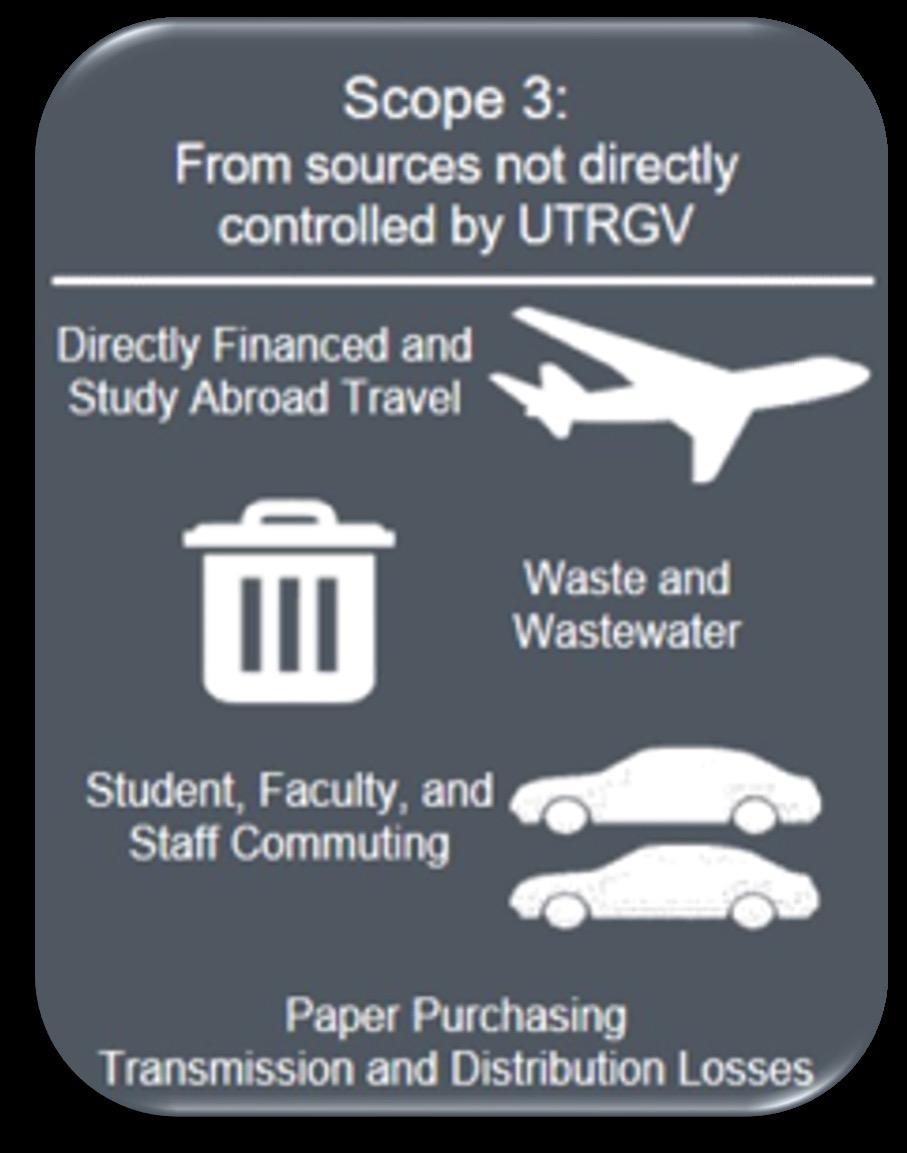FY21 Sustainability Benchmarking Analysis

March 2022
Emissions Sources at UTRGV



Scope Analysis Agenda and Vocabulary Used
o FY21 analysis excludes medical school.
o MTCDE (Metric Tons of Carbon Dioxide Equivalent)- measure includes all six greenhouse gasses, which are converted to CO2e.
o Adjusted floor area measurement that weighs more on energy intensive building.
o Weighted campus users is a measurement of an institution’s population that is adjusted to accommodate how intensively certain community members use the campus.

UTRGV Footprint Overview
Distribution of Emissions Shift in FY21
The lowest scope 3 emissions have been compared to previous years

61,737 MTCDE

MTCDE
FY21 Reported Emissions Profile at UTRGV


Total Emissions over Time at UTRGV
16% reduction in emissions from FY20 to FY21 primarily driven by Covid -19

Normalized Emissions Follow Similar Trend as Total Emissions
UTRGV’s weighted campus user and GSF produced the same normalization decrease


Comparing Changes in Gross Emissions to Changes on Campus
Space and enrollment has increased by 9.71% and 15.7% respectively since 2016; emissions increased in conjunction until FY20 and FY21 with the Covid-19 Impact


Scope 1
Total Stationary Fuel Consumption Slight Decrease in FY21
UTRGV uses a lower intensity fossil fuel, natural gas; Covid drove decrease since FY20


Fleet Fuel Consumption Decrease Mainly from Gasoline Fleet Reduction
A decrease for FY21 occurred since FY20
Fertilizer and Refrigerant Consumption Decrease and Increase Respectively
Spikes in refrigerants for FY21 is due to a small chiller repair, along with maintenance on several campus buildings; Fertilizer decrease due to UTRGV athletics games paused


Normalized Scope 1 Emissions
Considering the increase in enrollment, FY21 normalized campus footprint stayed consistent from FY20


Scope 2
Electric Consumption Stayed Steady From FY20
to FY21
Buildings still needed to electricity to run even when buildings were vacant


FY21 Scope 2 Normalized Emissions
Normalized campus footprint decreased for FY21 with remote courses still happening


Scope 3
UTRGV Waste Produced Decreases 23% in FY21
A couple waste disposal bins were unused for FY21 due to less people on campus


Wastewater Consumption Decreases in FY21


UTRGV Paper Consumption


Significant Decrease in Directly Financed Air and Grounds Travel
Directly financed travel halted throughout FY21


Permits Sold in FY21
A decrease in permits sold in FY21 decreased with the shift to remote learning

Post Pandemic Commuting Habits
A combination of a survey sent in fall 2020 along with permits sold for FY21 help depict the shift to “carbon free” commuting

FY21 Normalized Scope 3 Emissions
Low student/staff/faculty commuting emissions impacted scope 3 emissions the most

Overall FY21 Emissions
Scope 3 had the greatest reduction while Scope 1 and Scope 2 stayed steady from FY20

Sustainability Key Takeaways
Covid-19 Impacted Sustainability in FY21:
o All of FY21 was impacted by the COVID-19 pandemic which caused a transition to remote learning. UTRGV saw a reduction in emissions mainly across scope 3. This is due to significantly reduced commuting, traveling, trash removal, and paper consumption.
Commuting Survey Gives Insight on Campus Shift to Remote Learning:
o With a commuting survey distributed in Fall 2020, results gave insight into an increase “carbon free” commuting utilized by campus users. Distributing this survey on a each semester will help track shifts over time.
What’s Next for UTRGV?
o UTRGV’s mission statement includes having sustainable development on campus. To measure progress in this area, consider creating goals for utility reduction, educating the community on sustainability strategies, improving data tracking efforts, and utilizing market mechanisms to offset emissions such as purchasing offsets.
o The transition to remote learning will continue to impact FY22 and beyond. Increase in online classes available can provide a lessened effect on emissions emitted.
Reduction Strategies


